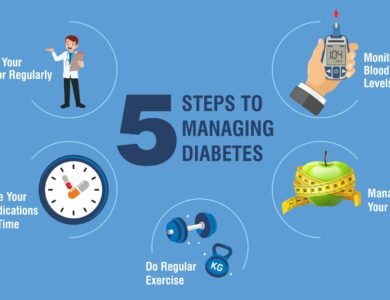
Feelings of pain and abdominal tightness result from a bloated stomach. There are various strategies to start feeling better physically and psychologically right away, even if the causes of bloating vary based on your body type for each individual.
There are several factors that might cause your stomach to feel bloated. These can be associated to environmental, physiological, and even hormonal factors. Finding the reason of the bloating is the first step in its reduction. Here are the four potential reasons for a bloated stomach as well as remedies.
Four reasons for a bloated stomach
Dysbiosis of the gut
An imbalance in the gut’s microbiome is referred to as gut dysbiosis. The healthy bacteria in the gut are essential for a wide range of functions. The loss of benevolent bacteria and the increase of harmful germs is known as dysbiosis. Gas and bloating are two significant negative effects of this intestinal imbalance. This is because of the substances that yeast and harmful bacteria create.
Related: Most Popular Herbs for Natural Blood Purification
PROBIOTICS ARE THE WAY TO GET RID OF IT
By taking a daily probiotic, you may effectively treat gut dysbiosis and, eventually, stomach bloating. Probiotics restore the beneficial bacteria in your stomach, which can aid with a number of digestive problems, including bloating.
In order to get its germs safely beyond your stomach acid, look for a time-released probiotic. This will also guarantee that you don’t only profit from those germs all at once but rather throughout the day.
2. Gluten allergy or intolerance
A naturally occurring protein called gluten is present in several cereals, namely wheat, barley, and rye. It is frequently present in ready-to-eat meals including pasta, bread, and cereal.
The sensitivity to gluten in certain people can result in a variety of health issues, including cognitive fog, gastrointestinal irritation, inflammation, and stomach bloating.
Celiac disease is an allergy to gluten that affects a certain population.
Simply getting into contact with gluten might produce major health negative effects in those with this sensitivity. People who are allergic to gluten must take particular care since it can be disguised in some meals.

ELIMINATION PROCESS: HOW TO GET RID OF IT
People who are allergic to gluten must take particular care since it can be disguised in some meals. Those who are gluten intolerant will gain by cutting gluten out of their diet.
If they ingest gluten voluntarily or unintentionally, they could also benefit from an enzyme supplement. These supplements include a unique combination of enzymes including amylase, protease, glucoamylase, and beta-glucanase that are needed to digest carbs.
If you have Celiac disease, a significant portion of your diet should consist of gluten-free items. A gluten allergy can be fatal, and it can also cause flare-ups that result in persistent exhaustion, considerable weight loss, uncomfortable gas and bloating, agitation, and even melancholy.
Related: 11 Dietary Guidelines to Reduce Belly Fat
FODMAPS 3.
Certain carbohydrates, referred to as FODMAPS, are more likely to result in or aggravate bloating and gas.
Every Day, Set the Stage for a Productive Day
You need a dependable morning routine if you want to feel more organised, focused, and energized throughout the day.
- To be productive all day, every day, learn how to construct one that works for YOU!
- morning_routine_guide_70.png
- Please enter your email address.
- Find Free Advice.
- Scroll down to read the rest of the article.
You may feel bloated after eating if the required enzymes for proper digestion are not present. Carbohydrates come in a wide range of shapes, and different enzymes are required for their digestion. You could feel bloated and have gas if one or more of these digestive enzymes are absent or insufficient in your stomach.
USE FOOD AS A TOOL TO GET RID OF IT
You might try different foods to see which ones might be causing your bloating. Garlic, artichokes, apples, mangos, prunes, cauliflower, and the majority of gluten-containing items are a few foods that frequently cause bloating. One approach to stop it from happening is to identify the items that make you bloated so you can avoid them.
After meals, taking a stroll might also help you feel less bloated. Long-lasting bloating that does not go away after taking simple precautions may be a sign of a more serious medical condition.
4. The American Standard Diet
Ironically referred to as the SAD, the Standard American Diet is just that—sad. This diet pattern, which is most prevalent in the West, includes a lot of refined carbohydrates, an unbalanced intake of omega acids, and processed convenience foods with high salt levels.
A bloated stomach is frequently the outcome of consuming a diet high in convenience and processed meals on a daily basis. Other, more severe adverse effects include obesity and a wide range of chronic diseases, such as cancer.
ADD MORE WHOLE FOODS TO YOUR DIET TO GET RID OF IT
This problem’s solution is both simple and challenging.
We’ve become acclimated to this eating style, and the majority of our meals are built around it. However, you may gradually start eliminating things that cause inflammation and bloating by incorporating more whole meals and produce.
The body processes refined carbs rapidly, which results in a sudden rise in blood sugar. In the long run, this might result in imbalances like Candida overgrowth and weight gain.
Omega fatty acids are an essential component of every diet, but inflammation and bloating can arise from an imbalance between pro-inflammatory omega-6 and anti-inflammatory omega.
Related: For All Fitness Levels, Here Are 9 Low-Impact Exercises
When Is Abdominal Bloating a Serious Issue?
Contact your doctor if you have persistent, chronic bloating so they can check to see if there’s a more serious underlying issue. Keep an eye on your bloating to see whether it worsens over time, persists for more than a week, becomes consistently more painful, or is accompanied by additional symptoms like fever or vomiting.
In certain situations, the source of the problem can be more serious. Exocrine pancreatic insufficiency, which occurs when there are insufficient amounts of the digestive enzymes required to adequately digest some macronutrients, is one of the most dangerous causes.
Another significant ailment that could be making your stomach bloat is gastrotriches, or stomach inflammation. A peptic ulcer, prolonged alcohol use, or specific bacterial infections like H. pylori are the main causes of this. Additionally, persistent and recurring stomach bloating may be caused by ascites. As a result of liver, renal, or cardiac illness, the abdominal cavity gradually fills with fluid.
Additional Strategies to Avoid Stomach Bloating
FODMAP intake, gluten sensitivity, and gut dysbiosis are common reasons of bloated stomachs that may each be treated differently. On a case-by-case basis, there are several other ways you may manage or avoid your stomach bloat. Some herbal teas, such as those with peppermint, ginger, or turmeric, might lessen gas and promote easier digestion.
These herbal teas might help lessen stomach bloating brought on by eating too much or too rapidly. Along with a strong probiotic pill, eating enough fibre, which is uncommon in today’s diet, can help reduce stomach bloating by feeding your healthy gut flora and reducing gut dysbiosis.
Another important approach to avoid frequent stomach bloat is to maintain appropriate hydration, which promotes proper motility and digestion. The Standard American Diet discusses how excess sodium is one of the reasons of bloating and may be eliminated from the body by drinking enough of water.
Finally, stress is a typical issue.
It may be treated using techniques that are specific to you and your circumstance, such as stress reduction techniques like exercise.
Final Reflections
Many people frequently suffer stomach bloating, although it shouldn’t last longer than a few days. Pay close attention to potential triggers, and the first step is to deal with these causes.
It might be necessary to consult a doctor if your bloating continues and gets worse over time so that the reason can be identified and the right course of action can be taken.



